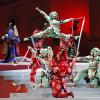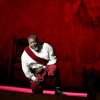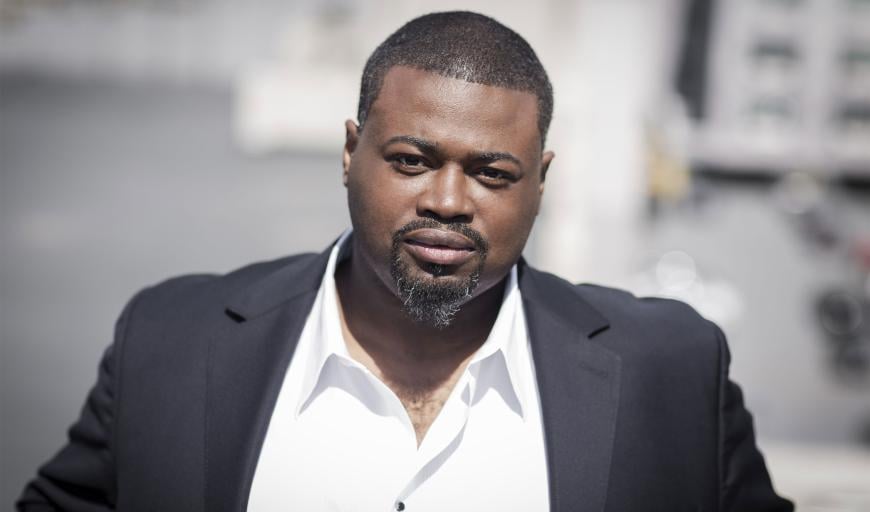
Tenor Russell Thomas will bare his soul in a saga of hurt, healing, and self-discovery at the Dorothy Chandler Pavilion on June 6. Part of Los Angeles Opera’s 2023–2024 season, the world premiere of Fire and Blue Sky, a five-movement song cycle by composer Joel Thompson and librettist Imani Tolliver, will be led by LA Opera’s resident conductor, Lina González-Granados. The work, based on Thomas’s own life story, details the lives of a son and mother (mezzo-soprano Deborah Nansteel) bound by trauma: a long-held family secret that Thomas was conceived following a sexual assault.
The tenor, who can also be heard as Calaf in LA Opera’s Turandot in four more performances (May 30 – June 8), explained that this project came about as part of his three-year tenure as LAO’s artist-in-residence, which began in 2021 and ends this June.
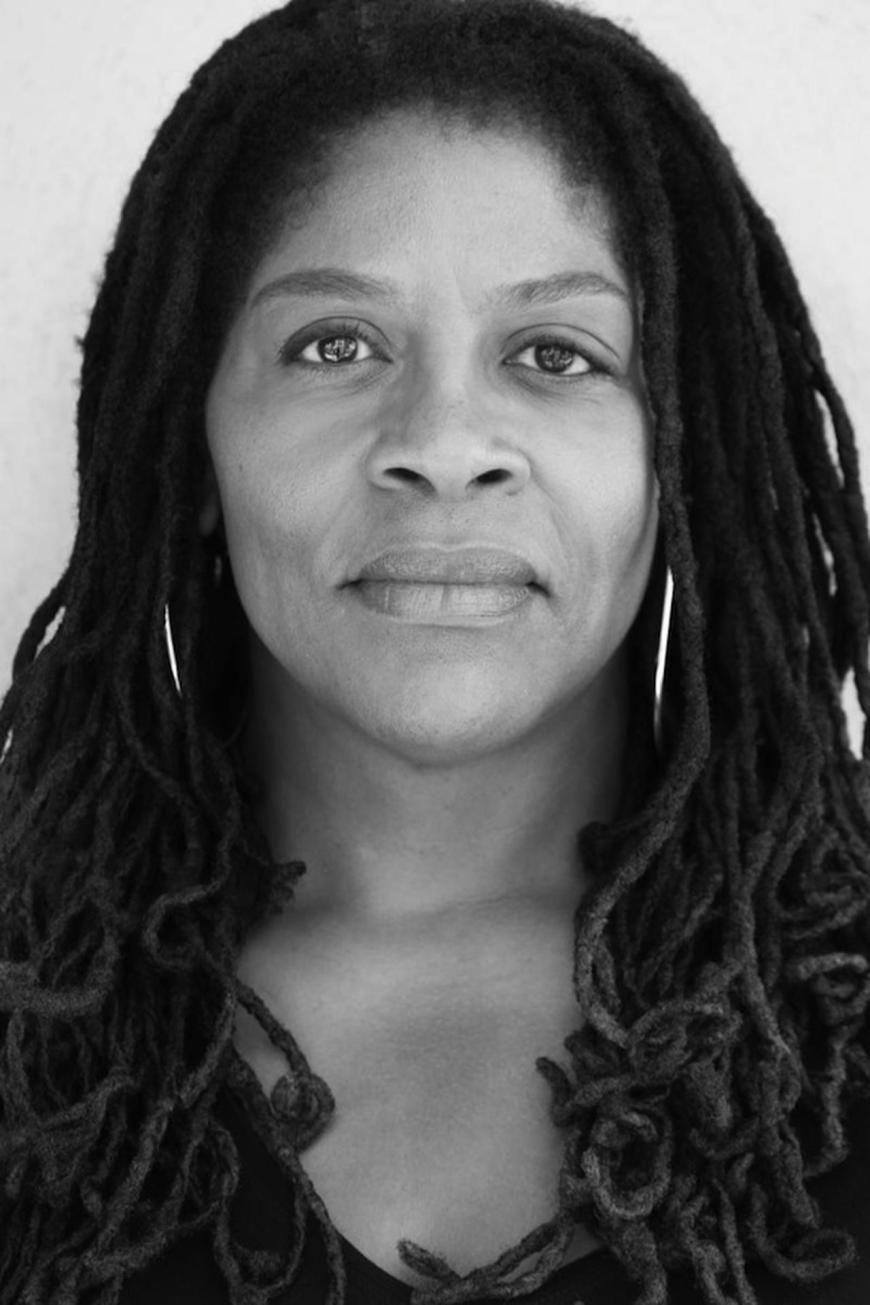
“When the opportunity came to do a new work to culminate my experience here,” said Thomas, 47, “Christopher [Koelsch, LA Opera’s president and CEO] was on board from the beginning. He knew what I wanted the piece to be about [and] helped me set up meetings with several poets and writers. I asked LA Opera to commission Imani Tolliver, an award-winning poet who has written extensively about her own childhood sexual trauma.
“I read a lot of her stuff [and thought], ‘This would be the perfect person to understand the emotional and psychological circumstances behind trauma.’ This [song cycle] is not so focused on the actual trauma but more overall on the impact of the trauma. She wrote a very moving piece of literature.”
Thomas, who grew up in Miami and has enjoyed a string of operatic triumphs in recent seasons, including performances as Don Carlo, Otello, and Rodolfo in La bohème at opera houses worldwide, pointed out that while he would have preferred a female composer, the choice of Thompson has proven auspicious.
“I thought it made sense to give a woman the opportunity to write this story musically,” said Thomas, “but none were available. I went to Joel, who I knew had experience writing vocal music that was beautiful. I got to know his music because he had this wonderful choral work, Seven Last Words of the Unarmed, a very powerful piece.
“I also knew he’d been commissioned to write a chamber opera for Houston Grand Opera [HGO]. I had friends that were in that opera, and [I] heard bits and pieces. The music was quite lyrical — these days, modern composers are almost afraid to write lyrical. I also wanted a piece not so angular [for Fire and Blue Sky], and we got something that is very lyrical and beautiful as well.”
Indeed, Thompson, who became HGO’s first full-time composer-in-residence in 2022 — a five-year engagement — is best known for Seven Last Words of the Unarmed, which commemorates the lives of seven Black men killed at the hands of police or authority figures. Premiered in 2015 by the University of Michigan Men’s Glee Club under the direction of Eugene Rogers, the work won the 2018 American Prize for Choral Composition, and Thompson and Rogers won a Michigan Emmy Award for a documentary about the piece in 2017.
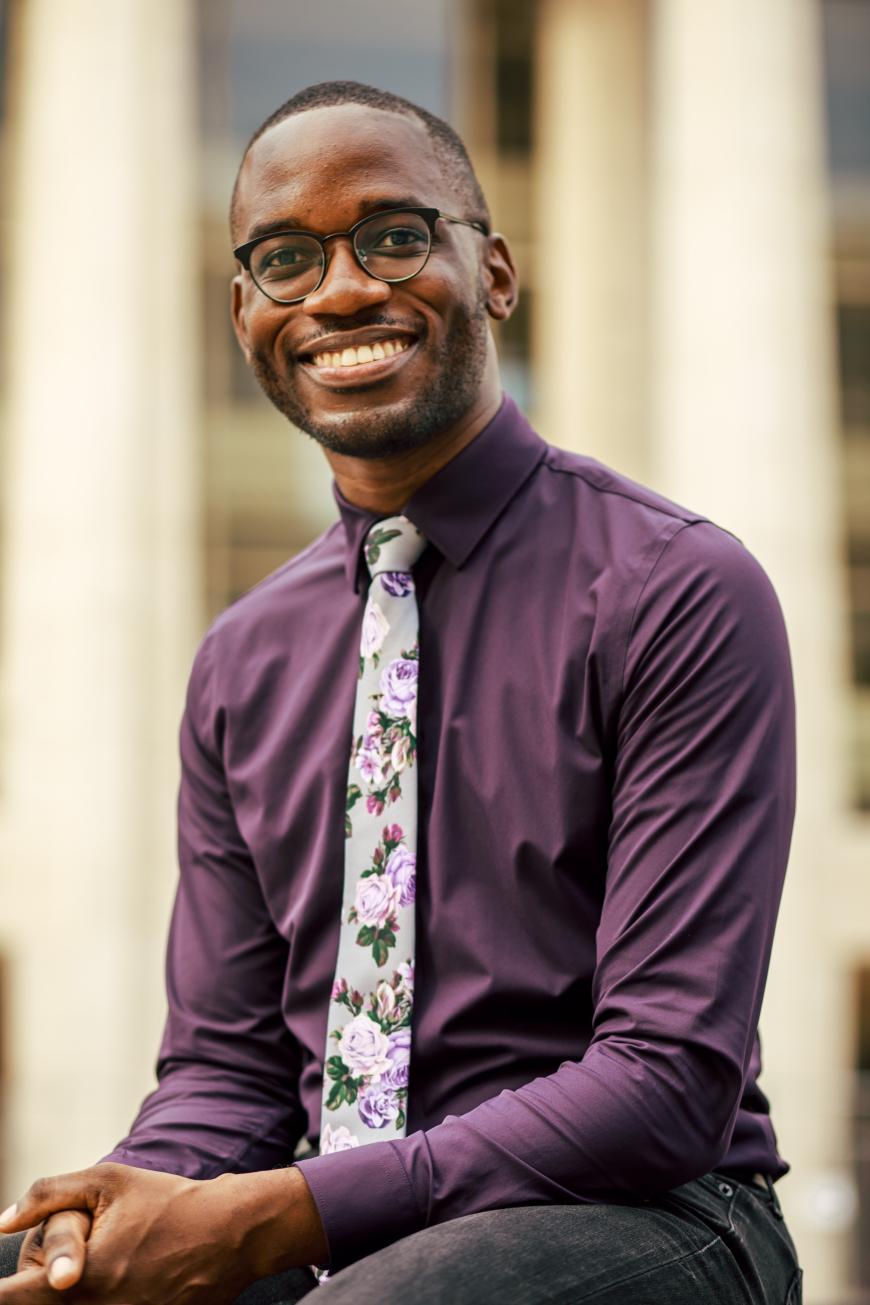
Speaking by phone from Houston, Thompson, who was born in 1988, said he’d heard of Thomas, who “reached out to me about this project, probably because he noticed in my output that I bare my soul as well. It seemed like a good fit, and it did reveal itself to be a good fit in the process.”
Thompson explained that once Tolliver was chosen as the librettist, she “started interviewing Thomas [and] came up with a really compelling text. And since I’m predominantly a choral and vocal and opera composer and I set a lot of texts all the time, her text sang to me immediately.”
Tolliver has served as poet laureate for the Watts Towers Arts Center and has also been awarded literary fellowships by, among others, George Washington University and Cave Canem Foundation (founded in 1996 by Toi Derricotte and Cornelius Eady to remedy the underrepresentation and isolation of African American poets in the literary landscape). But until Fire and Blue Sky, she had never written a libretto.
“I had written songs [and] lyrics and performed a lot with musicians,” said Tolliver. “I’ve also recorded poetry with music [but] not [anything like] a formal oratorio in that sense. I don’t think I was intimidated. To me, songs are poems, whether it’s Joni Mitchell, hip-hop, [or the opera] Carmen. I see lyrics and poetry the same way.”
Tolliver explained her process with Thomas: “What I did was I wrote notes about his [experiences]. I found songs and sounds that to me reflected some of what he told me, that made the images more colored and fleshed out. He would also share some of the music that inspired him during specific times of his life. I’m a very imagistic kind of writer, so I found music on my own and played that music as I wrote — some classical, but often it would be spiritual.”
Tolliver likened her process to painting with a large brush — “taking experiences, fleshing them out, making them broad enough.” It’s how she approaches all her work. “Whoever you are,” the poet stressed, “you could, if you experienced some form of loss or challenge or injury or pain, realize that there is a way to hopefully be inspired by those words and that music to find an entry point to it. That’s how I write.”
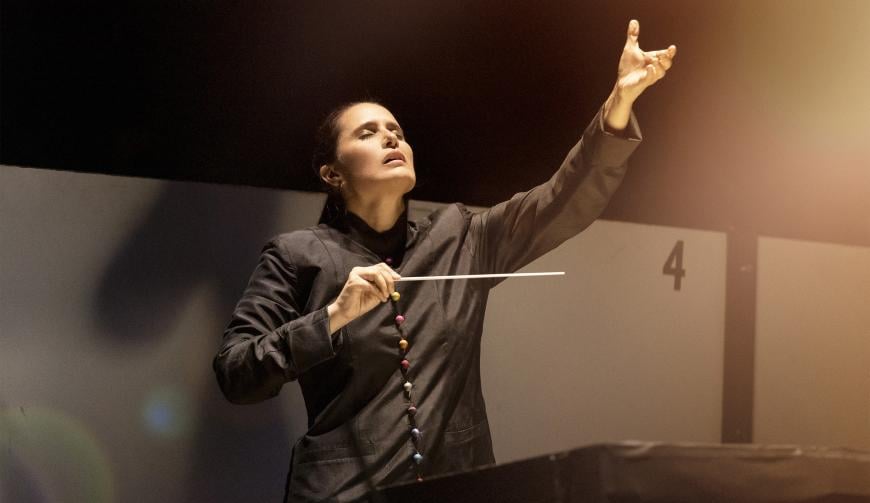
Fire and Blue Sky runs about 35 minutes, with the June 6 concert also featuring an orchestral suite from Thompson’s acclaimed first opera, The Snowy Day. That piece is a blissful celebration of childhood joy, which would seem to be light-years away from the soul-baring sounds of Fire. But the composer said that Tolliver’s text did “everything that we wanted it to do,” allowing space for multiple interpretations.
He explained: “There’s a danger in baring one’s soul, [that if] it becomes so specific to one’s trauma, no one else can have access to it. [Tolliver’s text] is full of the truth and heaviness and weight that Russell wanted to communicate and live in, but it’s just abstract enough. That’s the magic of poetry. There are multiple ways into the text, [and] it was my job as a composer to preserve those windows but still speak to the truth of what’s there.”
Thomas, who’s been lauded by Opera magazine for his “heroically shining tone of exceptional clarity and precision,” is certainly no stranger to passionate expression, but to sing his own personal truth in Fire is next-level emotional.
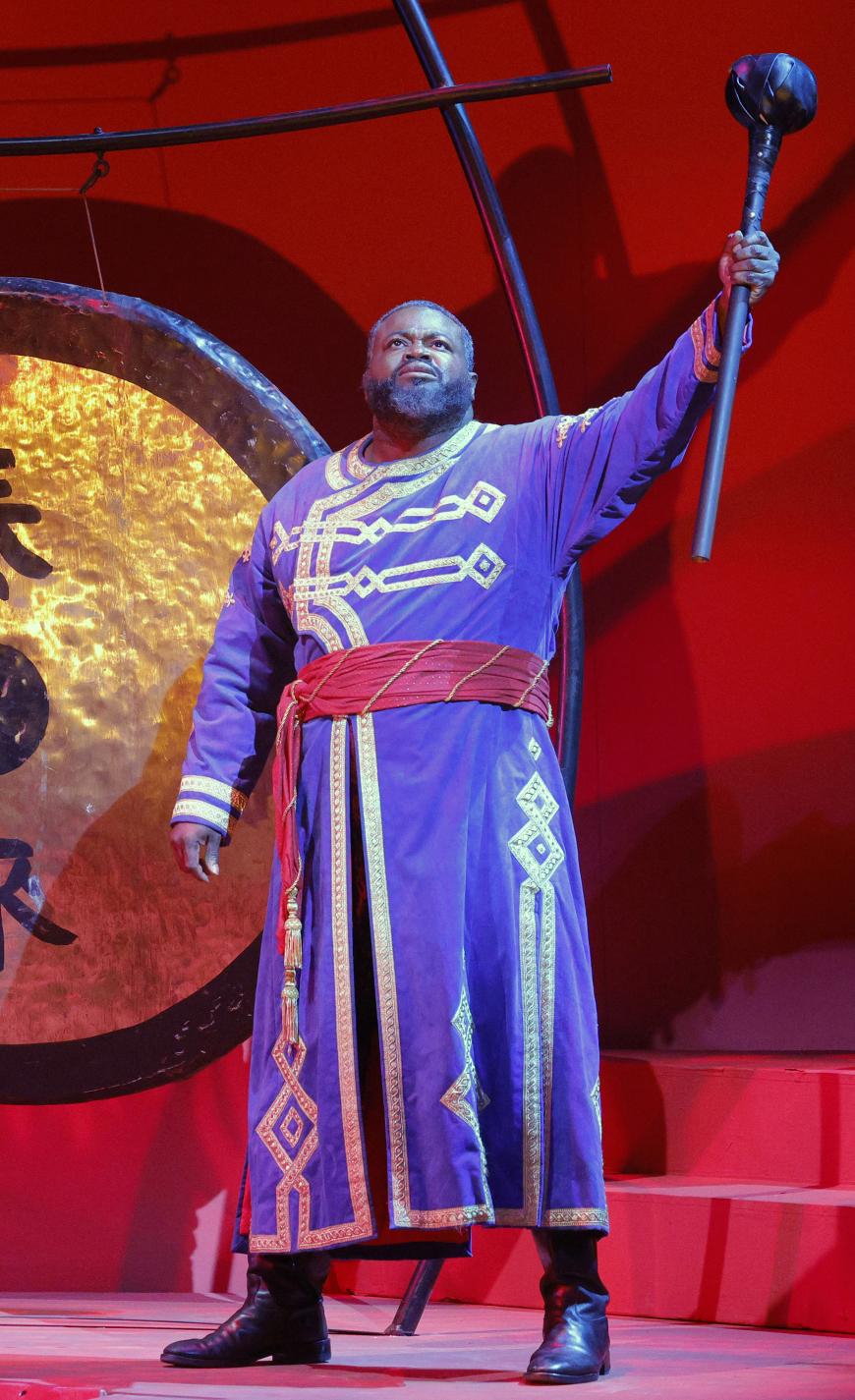
“It’s like therapy for me,” Thomas exclaimed. “One of the reasons why opera singers — we’re a bit strange already — [experience things so deeply] is because it’s our job to be so personal. It’s almost escapism. We get to pretend to be someone else onstage, but at the same time, we’re using our own body. It’s not like a pianist who can walk away from the piano. The success and failure of a night is such a personal experience for us. Singing Fire and Blue Sky is not different in that way, but this is my own story.”
“I consider myself to be a very honest performer — honest in terms of not a lot of histrionics or vocal excesses. That’s not my style,” the tenor added. “I think that has helped me grow as an artist over the years, [and] a work that is deeply personal like this will be the same. Hopefully it moves somebody whose experience has been similar. The baring of their soul, the telling of their story can be therapeutic.”
Thompson agreed: “What Russell communicated to Imani about the nooks and crannies he wanted to explore and heal from — the act of examining the ache, the hurt from all angles, like a diamond is examined from every facet, to put it on the table and walk away — that’s what, in James Baldwin’s words, is ‘to awaken the sleeper.’” (Thompson, in fact, set those words of Baldwin’s in a 2021 orchestral work that premiered at the Colorado Music Festival.)
The composer continued: “Taking deep hurt and pain and examining it and putting it on the table in the form of a composition and [then] moving on with life: I’m hoping that when Russell performs [Fire and Blue Sky], there is some healing that will happen as a result of communicating it. But it’s always an experiment until the first downbeat.”
As for the song cycle’s title, Tolliver said that Fire and Blue Sky is a “freedom song in many ways. It is an origin story of an artist — a universal artist who has experienced trauma. My point for myself, too, [is] I believe that our injuries and painful experiences we have had or share company with — our family, friends, people we are close to — those experiences, those injuries, don’t have to define us. Scars can become a map through healing. The origin story for all of us is not necessarily something that is of this earth. It’s much broader, and that’s where the sky comes in.”
The notion of healing, beginning with Seven Last Words, has been integral to Thompson’s music as well. “It was a way for me to wrestle with things I felt couldn’t be expressed in any other way. I don’t feel it’s very different from the tentpoles of the [classical] canon: Beethoven examining criminal justice in Fidelio [for example].
“Composers have always been writing about what compels or matters to [them]. I’m doing the exact same thing. I’m focused on healing as a Black man to create a more equitable future and, for whatever potential children I may have, to make the world better for us. Even though it’s not specific to racial healing, it’s on a personal healing level. I was pre-med as an undergrad, so the impulse toward healing is there, even though I’m not wearing a stethoscope daily.”
As for Thomas, he’s not shy to admit that he’d like the journey of Fire and Blue Sky to continue. “I wanted to tell this story. It shouldn’t be so unusual because this whole idea of art imitating life and vice versa — there are so many people who could connect with this story who are not necessarily afraid but kept it close to the chest. I’ve been asked by a few orchestras already, ‘What’s the plan after [the performance]?’ I would love for it to live on.”


